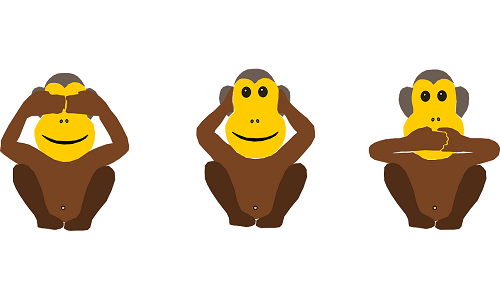Difference Between Dumb And Mute
What is the difference between ‘dumb’ and ‘mute’? The words are synonyms for each other. They both refer to being speechless, and the expression ‘deaf and dumb’ is known by English speakers. However, although the meaning by definition may be the same of these words, the usage can be very different, especially when referring to people. It should be noted that using ‘dumb’ is often inappropriate, and possibly even using ‘mute’ sometimes.
Dumb is an adjective. Its original meaning is to be lacking the power of speech. ‘Dumb’ can be used to describe animals and inanimate objects that obviously have no ability to talk. This meaning is expressed in ‘dumb waiter’, which is a mechanical device to carry things, like food and dishes between floors of a house or building. It is called ‘dumb’ because it acts like a human waiter delivering food or other items, but of course cannot talk because it is an inanimate object.
‘Dumb’ has another usage with humans. It means incapable of using speech because of being mute and unable to speak, most typically because of congenital deafness, or the inability to hear. However, it is not used in this way in modern speech by most people, and it can actually be considered quite offensive. The only way it is generally used in English today is to mean temporarily speechless, as with shock or fear. For example: I was dumb with disbelief when she appeared out of nowhere. Less frequently, but sometimes still used, it can also mean to be unwilling to speak, as in being shy. For example: Don’t just stand there dumb, say something!
The reason ‘dumb’ is often unacceptable to use in English relates to its other and more modern meaning of being conspicuously unintelligent or stupid. In this way, ‘dumb’ as slang is most often used by English speakers. For example: That was a dumb mistake. It can also be used to indicate that something was unintentional or haphazard, and that it did not require any skill. This is evident in the expression ‘dumb luck’. Because of this usage, it is considered offensive to refer to a person that cannot speak as ‘dumb’. It implies that the lack of ability to speak comes from a lack of intelligence or development, which is not the case in a deaf person.
‘Mute’ has the meaning of being unable to speak, similarly to ‘dumb’. Historically, ‘deaf-mute’ was a term to identify a person that was deaf and could not speak. While it still continues to be used to refer to people that are unable to speak, it can be considered offensive by some. It should be used with caution when referring to people. Most deaf people prefer to simply be considered ‘deaf’, even though that term does not have any bearing on a person’s ability to speak. ‘Mute’, however, is still often used to refer to inanimate objects. It most commonly, perhaps, used as verb meaning to turn off the sound of something. For example: Please mute the T.V., I am on the phone.
- Difference Between Hold on And Hang on - February 19, 2016
- Difference Between “Give it up” and “Applaud” - February 18, 2016
- Difference Between Condole And Console - February 17, 2016
Read More ESL Articles
Search DifferenceBetween.net :
6 Comments
Leave a Response
References :
[0]https://pixabay.com/en/ape-blind-deaf-dumb-troika-policy-159201/


Stop trying to be so Dumb. Deaf and dumb is still the way to say that a person cannot hear or speak. Mute means that they cannot utter sounds. Did you ever push the MUTE button on your electronic devices? You don’t get squeaks and yelps, you get silence. Only the PC crowd gets upset by every word spoken. Sometimes they should just hit their own MUTE button.
Cambridge®? Harvard®?? Oxford®??? Stanford®????°
(Assuming you meant “liberals” by “PC crowd”)
Thank you for your carefully written and nuanced definition of the word “dumb”. I know someone who calls himself dumb, yet he speaks incessantly. Now I feel better prepared to point out that he’s not dumb, because if he were, his silence would be perhaps his best quality!
I wonder if he’s using the more common and well-known usage, as a synonym of “unintelligent”. The word “stupid” has this problem as well (note the noun form “stupor” — suspension or great diminution of sensibility, as in disease or as caused by narcotics, intoxicants, etc.)
Hmmm. I am a Catholic priest, and the baptismal rite uses the phrase, “The Lord Jesus made the deaf to hear and the dumb to speak.” I always use the word “mute” instead of dumb, primarily because of the negative connotation of “dumb.”
I’ve never been that comfortable with “mute” either, but if I used “speech impaired,” then I’d also have to use “hearing impaired” instead of deaf. I wouldn’t mind doing so, but my brain can only deal with so many extemporaneous edits during any given ceremony…
Your explanation is so confusing that is useless. Dumb is someone who does not want to talk (due to psychological problems or just for the hell ot it), mute is someone who physically cannot talk.